 |
Organic Society
Formation of the
Holy Roman-German Empire
Plinio Corrêa de Oliveira
Regarding forms of government, one finds many paradoxes in the Middle Ages. On the one hand, there was a tendency for the smaller fiefs such as baronies and counties to join together into major fiefs, marches and duchies, and then several duchies to become kingdoms, as it happened in France.
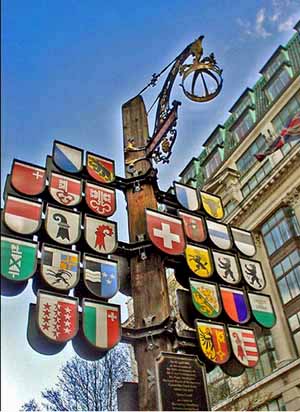
Crests of Swiss cantons |
On the other hand, there were units such as independent cities and small aristocratic or bourgeois republics that also tended to come together and form nations, such as in the case of Switzerland. It was formed by independent cities that merged into major groups, the cantons, and finally the Swiss nation. Switzerland was formed by many small aristocratic or democratic countries, so to speak, that joined together for the conveniences of each one.
This two-fold tendency to unite ended by constituting the Holy Roman German Empire, which hovered above the different kingdoms. Its sovereign was the Emperor of all Christendom, the King of the Kings and the Lord of the Lords – rex regum and dominum dominatium, to use a solemn expression from Scriptures.
When one bakes a cake in a wood-burning stove, the bottom part, which is closer to the fire, is cooked first and the top only later. So it was with the Holy Roman Empire: It was cooked from the bottom to the top.
I believe that, with the exception of Switzerland and Italy, no country in Europe is more divided than Germany. But it was from that conglomerate of small German counties that the Holy Empire was established.
Richness of the small political unities
Some of those minuscule counties have curious names, for example the County of Zweibrücken [Two Bridges], which, by the way, is mentioned often in the well-known Memoirs of the Duc de Saint Simon and also in those of the Baroness d’Oberkirch. If memory serves me well, it was an offshoot of the ducal House of Würtemberg. One can imagine this small County of Two Bridges and what it meant to be the Lord of Two Bridges... One might say that the only lord smaller than this would be the Lord of One Bridge.
Another example could be the lord of a schloss [castle] - there are many of them - set atop an enormous stone mountain like an eagle, a castle dominating one of those curves in the Rhine. Let us suppose that he became lord through a privilege his family acquired 500 years before for heroic deeds and had the right to collect a tax from merchants traveling by boat through the part of the Rhine that flowed in front of his castle.
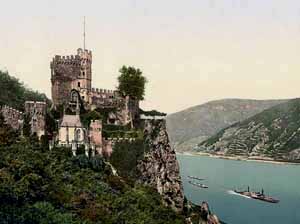
A castle overlooking the Rhine |
Actually, to maintain the Rhine would be little work for the nobles of a castle like that, since it is an easy road to keep; there are no repairs to make in the flowing waters. Nonetheless, the merchants had to pay in order to pass through his domain. The lord of that castle was the head of another small county, which had just a few thousand inhabitants.
With time the families of these small territories inter-married and established local dynasties with long names, with each adding the name of his original place. One of these houses is called Saxe-Coburg-Gotha. This was the collective name of two duchies, Saxe-Coburg and Saxe-Gotha in Germany. They located in what today are the States of Bavaria and Thuringia, respectively. Through family marriages the duchies merged and became a dynasty famous throughout Europe. Again, it expanded by marriages rather than by wars of conquest.
This was how the small counties merged and became the duchies. Through the centuries the four grand Duchies of Alemannia, Bavaria, Franconia and Saxony were consolidated. Besides these duchies, there were lesser duchies, marches headed by margraves and allodial lands ruled by feudal lords called Freiherr [literally “free lord”].
A picturesque distinction in this title involved the use of von or zu [of or in]: Freiherr von indicated lordship with effective command, for example, Rudolf von Waldenfels. Freiherr zu was a lord who had the right to use the title but no power, usually a relative of the acting lord. So one lord would be Freiherr von Guttemberg, the other Freiherr zu Guttemberg; if the Freiherr zu became the actual lord who wielded the power, he would have the right to use the title Freiherr von und zu [lord of and in], for example Heinrich von und zu Stein.
The process of electing an Emperor
Thus, by a slow process of integration, the Holy Roman German Empire was formed, and the German King was crowned Holy Roman Emperor of these regions. This dignity took longer to become hereditary, and it finally did so only in an adroit and somewhat oblique way.
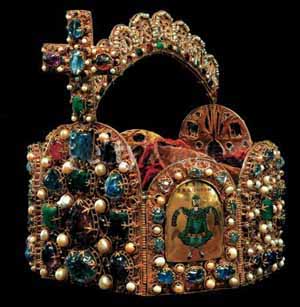
The crown used for the coronation until 1792 |
The Grand Duchies and some important Principates were sovereigns States, but they needed someone to represent their commons interests and judge their disputes. So they began to meet to elect this supreme arbiter. Since those Duchies in many ways were Kingdoms – some of them were later raised inorganically to kingdoms by Napoleon – they gave their leader the title of Emperor, and not just King.
The Prince-Electors of the Holy Roman Empire were called Kurfürsten. From the 13th century, there were seven Electors, three spiritual (the Archbishops of Mainz, Trier and Cologne) and four lay (the King of Bohemia, the Count Palatine of the Rhine, the Duke of Saxony, and the Margrave of Brandenburg). Two more Electors were added in the 17th century.
One Prince-Elector was the Archbishop of Cologne, who ruled as a kind of mayor over the city and its environs. He had the title of Archbishop Prince of Cologne. The Germans liked being governed in their temporal affairs by ecclesiastics. From this came the saying: “It is good to live under the staff” – Es ist gut zu leben unter der krummestab. In general the Bishops were more benign and disinterested and had greater consideration for their liberties than the temporal lords; therefore, life was more serene and peaceful under their rule.
There were also some small territories and states governed by women – something unprecedented in History. Yes, this in the historically masculine and military Germany! These states were governed by Abbesses, who, like the Bishops, ruled over some cities and their environs as temporal lords (ladies) and exercised power over the people of those areas. Those Abbesses were also generally well-liked by the people they governed.
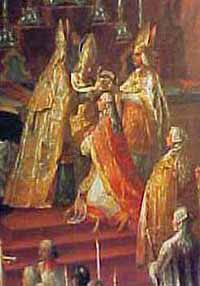
The Bishop Electors of Mainz, Trier and Cologne crown an Emperor |
The Prince-Electors used to meet in Frankfurt to elect one of their peers as King of the Germans, after which he would be crowned as Emperor by representatives of the Pope. Each Elector was a candidate and naturally wanted to be emperor. Hence, those meetings were marked by intense political rivalry that could even involve threats of wars among those powerful candidates.
Once the Emperor was elected, he was led to the high altar of the Cathedral of Frankfurt and was crowned there. Then the cortege would return to the electoral palace; from its balcony the Emperor would appear in full solemn garb to greet the people and preside over the public ceremonies and popular festivities, which included free food and drink for all.
This election first made in the city of Aachen, then in Frankfurt, had a long history. In 911 the Dukes of the Grand Duchies – Alemannia, Bavaria, Franconia and Saxony – elected Conrad I their King. Later in 962, King Henry designated his son Otto to be his successor, and he was elected Emperor with the blessing of the Pope
After all the politics, ceremonies and festivities, the real problems started: the Emperor had to govern those turbulent people. The Empire was still raw dough that needed to be baked. This was done slowly under the heat of the events of History. As a result, often the Emperor was no more than a straw puppet lacking the strength to impose his will on those powerful lords, who continued to do what they wanted.
The House of Austria
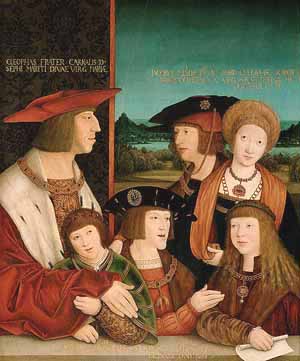
Emperor Maxmillian I of Habsburg, son of Emperor, with his son Philip, future Emperor |
Finally, from those failures one family emerged with the needed influence to govern. Through a series of dynastic marriages added to skillful diplomacy and good will, the House of Habsburg, or House of Austria, became the origin of all of the elected Holy Roman Emperors between 1438 and 1740.
With time, the House of Austria gradually changed the election process of the Emperor. While following the traditional system, it managed to elect its head as Emperor and simultaneously named the Emperor’s son as King of the Romans, signifying he was heir of his father. This process was repeated in subsequent elections. So, the title became hereditary.
This happened through a very slow process, where spontaneity played an important role. The policy of the Empire under the House of Austria served the member States quite well: While not admitting any evil whatsoever, it left great liberty for the good to act, even to the extent that at times things could appear chaotic. Under the leadership of the Habsburg, the over-exuberance of the Germanic peoples gradually subsided and left the stage that some unduly qualified as barbarianism.
This formation of the Holy Roman-German Empire would later extend to most of Europe. It stands as a good example of an organic society.

Posted December 10, 2010

  | | Prof. Plinio |
Organic Society was a theme dear to the late Prof. Plinio Corrêa de Oliveira. He addressed this topic on countless occasions during his life - at times in lectures for the formation of his disciples, at times in meetings with friends who gathered to study the social aspects and history of Christendom, at times just in passing.
Atila S. Guimarães selected excerpts of these lectures and conversations from the trancripts of tapes and his own personal notes. He translated and adapted them into articles for the TIA website. In these texts fidelity to the original ideas and words is kept as much as possible.

Related Topics of Interest
 The Coronation Feast for
the German Emperor The Coronation Feast for
the German Emperor
 St. Henry II, Emperor St. Henry II, Emperor
 How Intermediary Societies Participate in
the State Power How Intermediary Societies Participate in
the State Power
 Charlemagne's Counsels to His
Nobles Charlemagne's Counsels to His
Nobles
 The Organic Formation of a Region The Organic Formation of a Region
 The Art of Organic Government The Art of Organic Government
 Leadership Is Established by
Generosity and Gratitude Leadership Is Established by
Generosity and Gratitude
 The Fullness of Time The Fullness of Time

Related Works of Interest
|
|
Organic
Society |
Social-Political | Home |
Books | CDs |
Search | Contact Us |
Donate

© 2002-
Tradition in Action, Inc. All Rights Reserved
|
 |
|